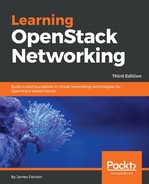Security groups are fundamental for controlling access to instances by allowing users to create inbound and outbound rules that limit traffic to and from instances based on specific addresses, ports, protocols, and even other security groups. Default security groups are created by Neutron for every project that allows all outbound communication and restrict inbound communication to instances in the same default security group. Subsequent security groups are locked down even further, allowing only outbound communication and not allowing any inbound traffic at all unless modified by the user.
Security group rules are implemented on the compute nodes and are triggered when traffic enters or leaves a virtual network interface belonging to an instance. Users are free to implement additional firewalls within the guest operating system, but may find managing rules in both places a bit cumbersome. Many organizations still utilize and rely on physical firewall devices to provide additional filtering at the edge of the network, which may mean coordination is required between users of the cloud and traditional security teams to ensure proper rules and actions are in place in all locations.
In the next chapter, we will look at implementing Role-Based Access Control (RBAC) within Neutron as a method of controlling access to networks between projects from an API perspective.
